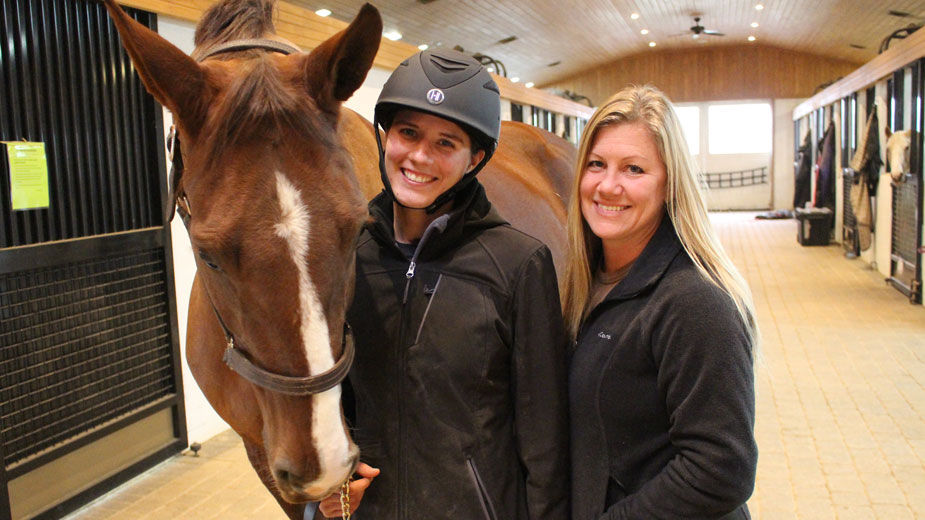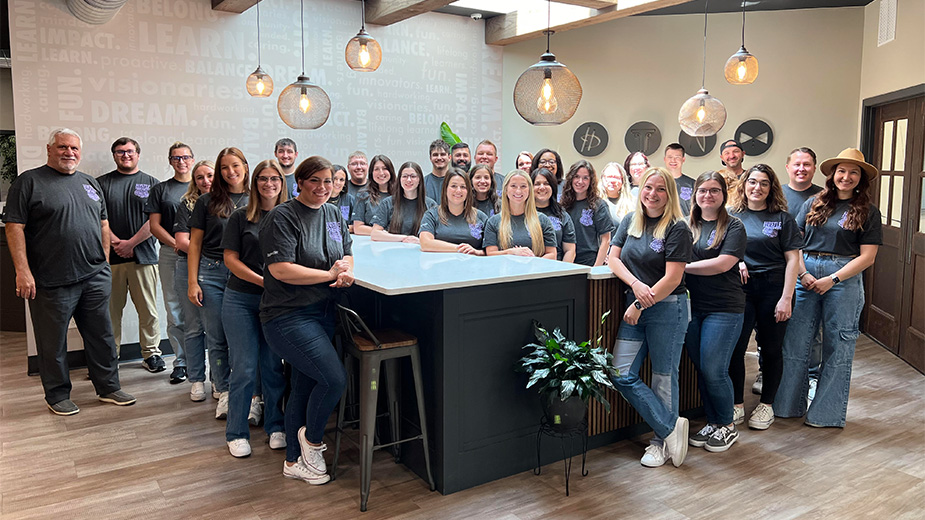Equestrians Make Careers of Riding and Training
YOUNGSTOWN, Ohio – Laura Kosiorek-Smith, a horse trainer and competitor, starts her day at 7:30 a.m. to take care of the six horses at her home. From there, she goes to another farm to care for six more horses and ride them. Finally, after a few riding lessons at yet another farm, she heads to Pure Gold Stables in Salem by 1 p.m., where she is head trainer and events manager.
“I get to Pure Gold and either ride or teach on an average of eight horses here, but I try and keep it down to three or four. I usually don’t leave until eight o’clock at night, and then I have to go back to the second barn of the day and take care of those horses again, and sometimes I’ll teach a lesson or ride if there’s time,” she says. “And finally I’ll go back to my house and take care of the horses on my farm, and then go to bed around 11 p.m. And I do it all again the next day.”
This is the typical life of a horse trainer – a lot of multi-tasking and a full day of horses, people and some dirty work. Margaret Fuchs of Fuchs Performance Horses at Saddle Creek Farms in Canfield and Linda Stevens of Fox Hollow Stables in Wampum, Pa., have also made a career out of training horses and riders in the region.
Kosiorek-Smith started riding horses when she was just three years old in Lake Erie, Pa.
“I got my first horse when I was 10. When we moved to Ohio, my parents wanted to sell that horse, and I told them if they sold her I was never coming home,” Kosiorek-Smith says with a laugh. “So they didn’t.”
Since joining Pure Gold, Kosiorek-Smith has earned professional status at the regional and national level because she can take on more quality training and sale horses through her clients as well as horses brought in for training at the stable.
Depending on her schedule, she spends about four to six hours daily in the saddle, which helps her become a better rider and compete at higher levels of competition with the training horses in and outside of the region. Word of mouth has doubled “or even tripled” her clientele since she started, she says. “I’ve essentially cut out 90% of my lessons, which was hard to do because I enjoy teaching, but I enjoy riding more.”
At Fuchs Performance Horses, Fuchs trains horses in reining, which she calls “figure skating on horseback.” The sport involves patterns with eight maneuvers each, where the horse performs movements such as sliding to a stop and spinning on its hooves, she says.
“I train for local and national clients and I teach riders,” Fuchs says. “I work with kids and adults from beginners to advanced. I usually have about 15 to 20 horses in training at a time and about 30 stalls for the training horses and some boarders.”
Since the International Federation for Equestrian Sports, or FEI, recognized reining as an equestrian sport in 2000, Fuchs says she noticed more awareness for the discipline and an increase in demand.
“We do more training than anything,” she says. “We sold most of our lesson horses and now we only do about half a dozen lessons a week. We compete all over the country in both winter and summer circuits.”
In Reining, she says, there is a place for all skill levels, from local shows that cost a few hundred dollars to larger, nationally recognized shows that can cost up to $7,500 for travel and competing.
Linda Stevens of Fox Hollow Stables started riding at eight or nine years old and officially began training horses by age 21, she says. She’s geared her business toward teaching lessons, in which there’s been a surge of interest over the past five years, and taking clients to shows in the Pennsylvania area. She charges $40 for an hour-long lesson.
“Every rider is different with their goals. Some want to compete and some just want to ride for fun,” she says. “I’ve had up to 50 students at a time, usually all Pennsylvania residents.”
Stevens takes her students to schooling shows all the way to nationally recognized events, where they often place in the ribbons. She runs a middle school and high school riding team and is the head coach of the Duquesne University equestrian team, which competes in the Intercollegiate Horse Show Association. Stevens coaches riders in the hunters – or hunt seat and jumper – disciplines a form of English riding that is judged on manners, movement and conformation of the horse as well as the rider’s ability and form.
“Riding is difficult because you’re teaching a feel,” she says. “You have to be able to feel everything that’s happening underneath you and problem-solve with the animal. It’s usually a miscommunication between rider and horse.”
Professional horse trainers require knowledge, a strong work ethic and understanding, she notes.
“Consistency with the horse is key,” she says. “Each horse you ride teaches you something. They each present a new issue and it’s the trainer’s job to problem-solve to smooth out the issues and create a better ride.”
Riders who transition to trainers must be able to listen and have patience, Stevens says. Her daughter, Alyssa, also rides and has helped her with the training and sale horses. Alyssa Stevens says growing up in competitive equestrian gave her many opportunities to learn and compete that other kids didn’t have.
“It builds character,” says the younger Stevens. “We don’t have any days off. We don’t get sick days or holidays off because the horses still need to be cared for and exercised.”
Kosiorek-Smith primarily competes and trains in eventing, “a triathlon for horses” she says. The discipline has three phases: dressage, which judges the horse’s suppleness and balance while following a lettered pattern; show jumping, including precision and speed over fences; and cross-country, which tests the control and stamina of horse and rider while jumping over solid obstacles outdoors through water and over hills.
Each year, she enters up to five competitions recognized by the United States Eventing Association and United States Dressage Federation, as well as many smaller shows. This past summer, Kosiorek-Smith won the Young Horse Four-Year-Old Championship’s East Coast competition.
When it comes to finding good horses to train and compete, “we are blessed to be in this area,” Kosiorek-Smith says. While any horse can be good for eventing, she says off-the-track racehorses, often mixed with warmbloods, are the most popular for it. Presque Isle Downs and Casino in Pennsylvania and Mountaineer Racetrack and Casino in West Virginia sell retired off-the-track thoroughbreds, she says.
The cost to compete at horse shows can range up to $300 per weekend for a local show and up to $2,000 per weekend for nationally recognized shows around the region, Kosiorek-Smith and Stevens say. In order to have all the equipment needed for the shows and everyday training, Kosiorek-Smith, as well as Fuchs of Saddle Creek Farms, find what they need at local tack shops such as Big Dee’s Tack and Vet Supplies in Streetsboro.
Jena Ianiro, marketing manager of Big Dee’s, says that the farm sells locally, nationally, and internationally. The store draws a mix of riders, trainers and farm owners who purchase tack – horse equipment, such as saddles and bridles – clothing, farm and veterinarian supplies. Business has been steady the past few years, she says, with the usual spike in sales during the spring.
“I think we are very competitive with quality and our price is better,” Ianiro says.
Kosiorek-Smith says the journey as an independent trainer hasn’t always been easy, but what she’s learned and accomplished has set her up for success.
“I don’t come from money, nor do I have someone that’s funding it all,” she says. “You work like hell and you figure it out. You just make it work to get to where you want to be.”
Pictured: Pure Gold Stables’ event manager, Laura Kosiorek-Smith, and manager Candace Hill, are joined by Angel in the farm’s stable.
Copyright 2024 The Business Journal, Youngstown, Ohio.


